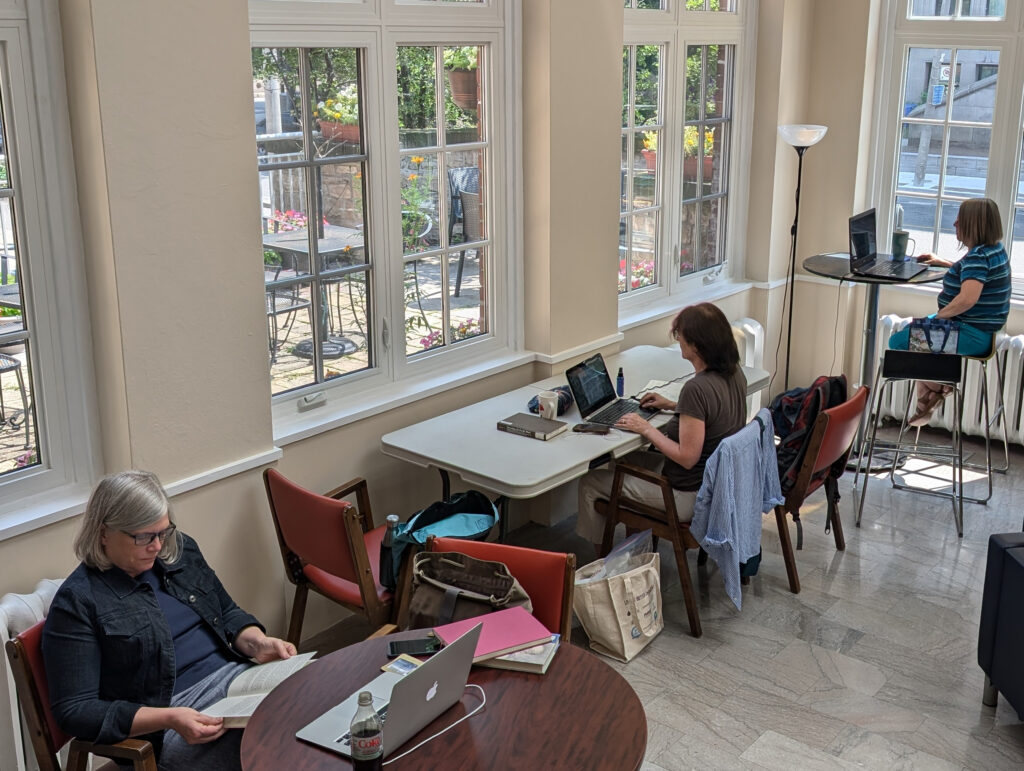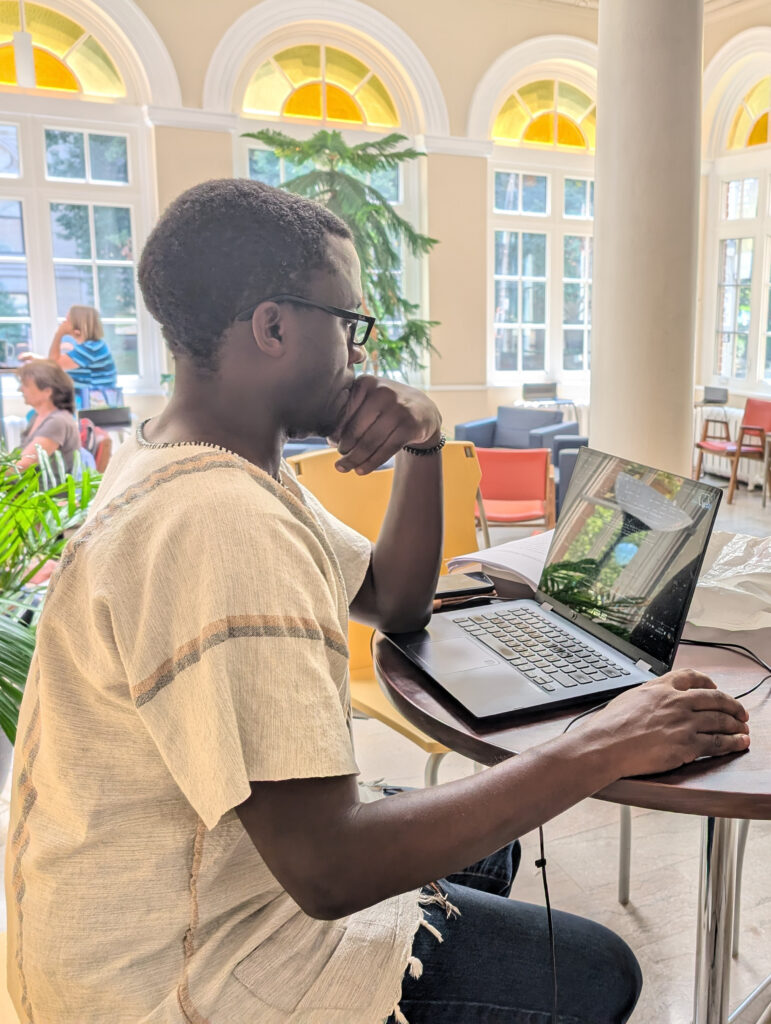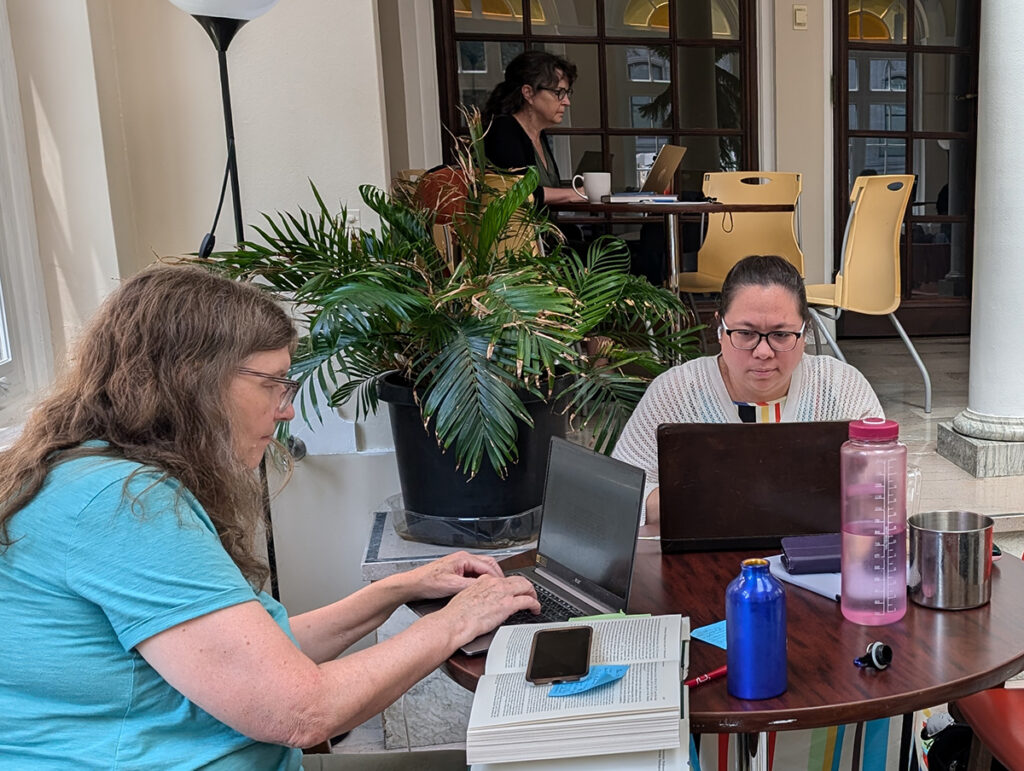Regis St. Michael’s faculty members are challenging the isolation of academic writing by implementing a weekly writing circle for students at RSM.
“The transition from coursework to the writing period for doctoral students is a tough one. Suddenly, there’s less structure — you don’t have to go to class, you don’t have a professor telling you what to read, you don’t have enforced deadlines — you shift to a period of greater self-direction,” says Professor Colleen Shantz, Director of Advanced Degree Programs at Regis St. Michael’s. “Part of focusing on students’ well being is figuring out how to support students during difficult times in their academic journey.”

Shantz started the writing circle in the fall 2023 semester by booking a space where students and faculty alike can write. Faculty were asked to invite students who might be interested, and it spread by word of mouth. It has continued to draw students and faculty members over the summer.
“It’s very helpful to have company and it keeps me on task. I find when I’m by myself, I get distracted, start doing emails or just daydream. The presence of other people keeps me focused and that’s what I’m here for,” says doctoral candidate Susan McElcheran, who has been coming to the writing circle since it began.
The format is simple: interested participants arrive at the Regis St. Michael’s solarium prepared to work. A timer is set for 45 minutes and participants write independently until the timer goes off. Each 45-minute writing session is followed by a 15-minute break, and there’s a half hour break for lunch.
“The timer is this funny little simple boundary that protects the space for writing,” says Shantz.
“When that timer goes off, invariably, someone says, ‘So I was thinking about this; what do you guys think?’ or someone will say, ‘How do I cite this?’ The ability to throw out something immediately and have an immediate response from other people is really helpful,” says doctoral candidate Tina Drakeford.
Doctoral candidate Fr. Gustave Ineza, OP, also finds the instant feedback helpful. “During breaks, we can ask each other questions and learn from each other,” he says.
In addition to gaining practical advice, students also get a glimpse into academic life.
Cynthia Cameron, Assistant Professor of Religious Education and the Patrick and Barbara Keenan Chair in Religious Education, has also been coming to the writing circle since its inception and has found it invaluable.

“For faculty who come, it’s not only a productive use of time, but we also model a more realistic vision of what the academic life looks like for our doctoral students. When I was a doctoral student, I thought that writing was something that you did alone and it comes out perfectly,” she says.
“The writing circle breaks down this stereotype, or this misunderstanding, that academic writing is a solitary thing. I don’t think there’s anything that I have ever written that hasn’t been read by other people. When I write a draft, I share it with somebody to get their feedback or I may talk out a problem with somebody else. Even writing in the presence of other people can be a part of that,” Cameron adds.
The physical space of the Regis St. Michael’s solarium has proven to be an ideal setting for this initiative.
“Just being in a solarium where the sun is pouring in, and even in the winter, changes your entire outlook on writing. You don’t feel like you’re locked into a dark room.” says Drakeford.
“It surprised me how something so simple has really been effective in keeping people writing and counteracting some of what is unhealthy in higher education. It reinforces how it’s unnecessary for higher education to feel isolating. It was so easy to create a community that can help overcome the sense that you’re toiling away on your own in a never-ending task,” says Shantz.
It’s so simple and the results prove it works. “I’m much more productive than if I was writing on my own,” says Ineza.
The writing circle will run on Wednesdays until the end of August and resume later in September on Fridays.

